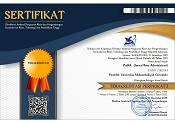Smart Village Governance: Citizen Participation In Panggungharjo Village-Owned Enterprise
Abstract
This study focuses on participation in the implementation and influence of community participation on the application of Smart Village in Village-Owned Enterprise. In the theory of community participation in the implementation phase, there are indicators to measure community participation, namely participation with energy, participation with money, participation with goods, and also participation with ideas. This research uses a quantitative approach with data collection, namely questionnaires and literature study. The population number of studies was 28141 people. The sample calculation results in this study were 100 respondents. The survey results are then processed using SmartPLS 3.0 software. The results show that of the four indicators of community participation mentioned above, two of them influence the development of Smart Village. At the same time, the other two do not affect the development of Smart Village. Indicators that influence the development of Smart Village are participation with energy and participation with goods. In other words, residents of Panggungharjo Village participated in the implementation of the Smart Village in Village-Owned Enterprise and donated some of the items needed to develop the Sustainable Village-Owned Enterprise Panggung Lestari. Whereas participation with money and participation with ideas do not influence the development of Smart Village. The recommendation in this study is that the village government or Village-Owned Enterprise managers can increase community participation in various ways such as involving the community directly in the management of Village-Owned Enterprise and providing space for the community to contribute actively to the form of physical participation
Keywords
Full Text:
PDFReferences
Aries, B., & Budiandrian, B. (2019). “Smart City and Smart Village” Ikhtiar Lompatan Pembangunan Nasional.
Aziiza, A. A., & Susanto, T. D. (2020). The Smart Village Model for Rural Area (Case Study: Banyuwangi Regency). IOP Conference Series: Materials Science and Engineering, 722(1). https://doi.org/10.1088/1757-899X/722/1/012011
Firmansyah, I., & Syaepudin. (2018). Model Smart Village Berbasis Teknologi Informasi (Studi Kasus: Kecamatan Surade, Kabupaten Sukabumi, Propinsi Jawa Barat). Jurnal Desa, 1(1).
Herdiana, D. (2019). Pengembangan Konsep Smart Village bagi Desa-Desa di Indonesia. Iptek-Kom, 21(1), 1–16. https://doi.org/10.33164/iptekkom.21.1.2019.hal
Iqbal, M. (2019). Accountability in the Management of Papua’s Special Autonomy Funds in Asmat Regency In the 2015-2018 Period. In Third International Conference on Sustainable Innovation 2019–Humanity, Education and Social Sciences (IcoSIHESS 2019). Atlantis Press.
Kushartono, E. W. (2016). Pengembangan Desa Mandiri Melalui Pengelolaan Badan Usaha Milik Desa ( BUMDes ) Fitrie Arianti Universitas Diponegoro Semarang. Jurnal Dinamika Ekonomi Dan Bisnis, 13(1), 67–81.
Kusuma, G. H., & Krisnadewara, P. D. (2019). Innovation Challenges of Village-owned Enterprises. Kinerja, 23(1), 54–66.
Larasdiputra, G. D., Anggiriawan, P. B., Kawisana, P. G. W. P., & Putra,
I. G. B. N. P. (2019). The Role of Village Owned Enterprises in Increasing the Rural Economy. International Journal of Advances in Social and Economics, 1(2), 60. https://doi.org/10.33122/ijase.v1i2.41
Nurfaisal, M. D., Mutiarin, D., Saputra, H. A., & Latif, I. R. (2020). Smart Village Accountability: Comparative Study in Management BUMDes Tirta Mandiri and BUMDes Giritama As a Village Income Earner in 2018. JIP (Jurnal Ilmu Pemerintahan): Kajian Ilmu Pemerintahan dan Politik Daerah, 5(1), 20-46.
Phong, N. D., Nhat, T., Duyen, L., Duong, L. M., Wassmann, R., & Sander, B. O. (2019). Participatory prioritization of climate-smart agriculture techniques: Case study of processes and outcomes from the Tra Hat Climate-Smart Village in Vietnam.
Pratiwi, E., Sujana, I. N., & Haris, I. A. (2019). Persepsi Dan Partisipasi Masyarakat Terhadap Penerapan Program Kerja Bumdes
Dwi Amertha Sari Di Desa Jinengdalem. Jurnal Pendidikan Ekonomi Undiksha, 11(1), 285. https://doi.org/10.23887/jjpe.v11i1.20161
Rachmawati, R. (2018). Pengembangan Smart Village Untuk Penguatan Smart City Dan Smart Regency. Jurnal Sistem Cerdas, 01(02), 12–18.
Sofyani, H., Atmaja, R., & Rezki, S. B. (2019). Success Factors of Village-Owned Enterprises (BUMDes) Performance in Indonesia: An Exploratory Study. Journal of Accounting and Investment, 20(2). https://doi.org/10.18196/jai.2002116
Somwanshi, R., Shindepatil, U., Tule, D., Mankar, A., Ingle, N., Rajamanya, G., & Deshmukh, A. (2016). Study and development of village as a smart village. Int. J. Sci. Eng. Res, 7(6).
Srirejeki, K. (2018). Empowering the Role of Village Owned Enterprises (BUMDes) for Rural Development : Case of Indonesia. Journal of Accounting, Management, and Economics, 20(1), 5–10. Retrieved from http://jos.unsoed.ac.id/index.php/jame/article/view/1018/727
Subekti, T., & Damayanti, R. (2019). Penerapan Model Smart Village dalam Pengembangan Desa Wisata: Studi pada Desa Wisata Boon Pring Sanankerto Turen Kabupaten Malang. Journal of Public Administration and Local Governance, 3(1), 18. https://doi.org/10.31002/jpalg.v3i1.1358
Tiballa, R. (2017). Partisipasi Masyarakat Dalam Pelaksanaan Program Badan Usaha Milik Desa ( Bumdes ) Di Desa Swarga Bara Kabupaten. EJournal Ilmu Pemerintahan, 5(1), 445–456.
Article metrics
Refbacks
- There are currently no refbacks.
Copyright (c) 2021 Publik (Jurnal Ilmu Administrasi)

This work is licensed under a Creative Commons Attribution-ShareAlike 4.0 International License.

Publik (Jurnal Ilmu Administrasi) is licensed under a Creative Commons Attribution-ShareAlike 4.0 International License.










